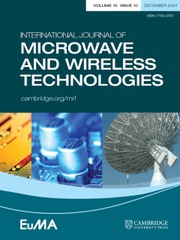A low-cost wideband phase shifter for two-way mm-wave phased array antenna system
Published online by Cambridge University Press: 02 November 2017
Abstract
This paper presents a wideband, low-cost, high-performance, and continuous phase shifter for millimeter-wave (mm-wave) phased array systems. Its operational principle is based on modifying the propagation mode of a grounded coplanar waveguide (GCPW) line by placing a high dielectric constant slab over the GCPW line. The propagation constant and hence the phase shift is varied by changing the air gap height between the GCPW line and the dielectric slab. As a proof of concept, a piezoelectric transducer is used to precisely control this air gap height. A printed circuit board-based phase shifter prototype has been designed, fabricated, and tested at two different frequency bands (19–21 and 28.5–30.5 GHz), which are the downlink and uplink bands, respectively, of the Ka-band two-way satellite communication system. A continuous and almost linear phase–voltage characteristic has been achieved experimentally with average phase shift variations 170° and 260° over the two bands, respectively. The footprint of the proposed phase shifter is 2.1 mm×3 mm, which is quite small and suitable for low-profile mm-wave applications. The average insertion losses over the two bands are <0.53 and 2.35 dB with very low variations±0.22 and ±0.35 dB, respectively.
Keywords
- Type
- Research Papers
- Information
- International Journal of Microwave and Wireless Technologies , Volume 10 , Special Issue 1: Journee Nationale des Micro-ondes 2017 , February 2018 , pp. 77 - 86
- Copyright
- Copyright © Cambridge University Press and the European Microwave Association 2017
References
REFERENCES
- 6
- Cited by


